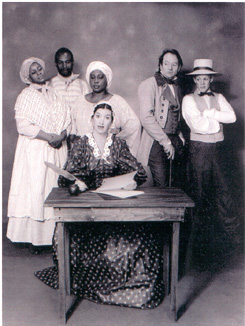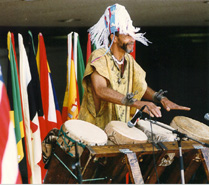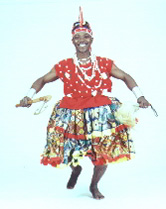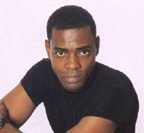 Each February, NHS and UNMC faculty, staff and students join the rest of America in celebrating African American history and culture during Black History Month.
Each February, NHS and UNMC faculty, staff and students join the rest of America in celebrating African American history and culture during Black History Month.
This year, the campus is invited to attend a free presentation on Friday, Feb. 28, of “Let My People Go: Trials of Bondage in Words of Master and Slave,” one of the most thought-provoking, historically-researched productions ever on the true social realities of slavery and post-Civil War racial and gender issues. The critically acclaimed play also will be performed twice at the Rose Blumkin Performing Arts Center as a benefit for the Center for Human Diversity.
There are two other programs on the NHS/UNMC campus for Black History Month. On Wednesday, Feb. 5, there will be a thrilling exploration of traditional African rhythms and dance when Seku Neblett, human rights activist and master of the African drum, performs with Charles Ahovissi, internationally acclaimed dancer/choreographer from Benin, West Africa.
On Thursday, Feb. 20, Vincent Alston (who played Malcolm X in last’s year’s presentation of the dramatic play “The Meeting,”) returns with a new production titled “Spoken Word.” Alston and several poets will perform dramatic readings accompanied by live contemporary music.
The schedule of performances is as follows:
- Wednesday, Feb. 5 — African Dance/Music by Seku Neblett and Charles Ahovissi, noon to 1 p.m., Wittson Hall Room 3034.
- Thursday, Feb. 20 – “Spoken Word” with Vincent Alston and Poets, noon to 1 p.m., Storz Pavilion (Lower Level of NHS Clarkson Hospital), 42nd Avenue and Dewey Street.
- Friday, Feb. 28 – “Let My People Go: Trials of Bondage in Words of Master and Slave” at 11:30 to 1 p.m., College of Nursing Cooper Auditorium (running time is 1 hour, 10 minutes with 20 minute Q&A afterwards), 42nd Avenue and Dewey Street.
- Friday, Feb. 28 – “Let My People Go: Trials of Bondage in Words of Master and Slave,” at 8 p.m., Rose Blumkin Performing Arts Center, 2001 Farnam Street, admission is $20.
- Saturday, March 1 – “Let My People Go: Trials of Bondage in Words of Master and Slave,” at 8 p.m., Rose Blumkin Performing Arts Center, 2001 Farnam Street, admission is $20.
“Let My People Go”
“Let My People Go: Trials of Bondage in Words of Master and Slave” is based on documents about slaves and slavery collected from 175 Southern county courts and state archives by Loren L. Schwiniger, professor of history at the University of North Carolina at Greensboro. In 2001, the play was sponsored in Omaha by Valda Ford, founder and director of the Center for Human Diversity, and drew an audience of more than 1,000 people to the Omaha Public School TAC Building on the night of a snowstorm.
“The six actors — three Caucasians and three African Americans — create an incredible overview of the social realities of slavery in America,” said Ford, director of UNMC/NHS Community and Multicultural Affairs. “The audience was deeply moved as it received extraordinary, historically-documented lessons on just how much slavery not only ruined the lives of black people, but was profoundly destructive to Caucasian relationships, as well.
“Having the play performed live on campus is an historic multicultural opportunity to experience gifted actors, accompanied by a wonderful score of great spiritual music. This play is just a must see for anyone interested in understanding human relations.”
Proceeds from the performances at The Rose will benefit The Center for Human Diversity. The Center provides a forum that facilitates cultural understanding and cultural competence. It is designed to address the changing face of Nebraska and the specific issues surrounding care of all people in Nebraska. The Center offers a 10-month comprehensive training program open to any person or organization interested in providing high quality care or service in a diverse environment.
Seku Neblett
 Seku Neblett’s life has been as diverse as the poly-rhythms he beats on his massive African drum ensemble. Born the son of sharecropper, he earned music scholarships at a young age. Neblett was one of the original civil rights “Freedom Riders.” He has been beaten, shot at, jailed and suffered through a series of voting rights campaigns in Georgia. In 1962, he met with Dr. Martin Luther King, Jr., as part of a delegation of the Student Non-Violent Coordinating Committee.
Seku Neblett’s life has been as diverse as the poly-rhythms he beats on his massive African drum ensemble. Born the son of sharecropper, he earned music scholarships at a young age. Neblett was one of the original civil rights “Freedom Riders.” He has been beaten, shot at, jailed and suffered through a series of voting rights campaigns in Georgia. In 1962, he met with Dr. Martin Luther King, Jr., as part of a delegation of the Student Non-Violent Coordinating Committee.
Neblett also immersed himself in African culture and politics and became a student of African music. In the 1990s, he studied African rhythms and drumming in Senegal and the Virgin Islands. Since then, he has been affiliated with the Nebraska Arts Council and has served numerous local schools as an artist in residence.
Charles Ahovissi
 Charles Ahovissi was a member of the Ballet National du Benin and La Troupe de Ballet Les Uper Anges. He has traveled as a dance troupe member or solo artist/choreographer to Spain, France, Belgium, England, Switzerland, China, Senegal, Nigeria, Niger, Ivory Coast, Togo, Cameroon, Gabon and half of the United States.
Charles Ahovissi was a member of the Ballet National du Benin and La Troupe de Ballet Les Uper Anges. He has traveled as a dance troupe member or solo artist/choreographer to Spain, France, Belgium, England, Switzerland, China, Senegal, Nigeria, Niger, Ivory Coast, Togo, Cameroon, Gabon and half of the United States.
He performed in Omaha in 1991 and relocated to Omaha permanently in 2000. He choreographed all the dance scenes in the 2000 production of “Mufaro’s Beautiful Daughters” at The Rose Blumkin Performing Arts Center. Ahovissi continues to teach master classes for local ballet students and African dance classes at the University of Nebraska at Omaha’s Dance Company.
Vincent Alston
 Vincent Alston’s production of “Spoken Word” is developed around the theme of African American empowerment. Backed by live musicians playing an array of jazz, R&B and hip hop rhythms, Alston and his poets give dramatic readings that will compare to the popular HBO show “Def Poetry.” Alston is also a member of the Nebraska Arts Council. In addition to his recurring role as Malcolm X in “The Meeting,” the full-time actor and entrepreneur recently starred in the John Beasley Theater production of “Joe Turner’s Come and Gone” and did voice over work in the PBS cartoon, “Liberty’s Kids.”
Vincent Alston’s production of “Spoken Word” is developed around the theme of African American empowerment. Backed by live musicians playing an array of jazz, R&B and hip hop rhythms, Alston and his poets give dramatic readings that will compare to the popular HBO show “Def Poetry.” Alston is also a member of the Nebraska Arts Council. In addition to his recurring role as Malcolm X in “The Meeting,” the full-time actor and entrepreneur recently starred in the John Beasley Theater production of “Joe Turner’s Come and Gone” and did voice over work in the PBS cartoon, “Liberty’s Kids.”
For more info
For more information about any of the above presentations, contact Walter Brooks at 559-5768 or e-mail wbrooks@unmc.edu. For more information about the Center for Human Diversity, contact Cindy Mitchell at 559-9660 or visit www.centerforhumandiversity.org.